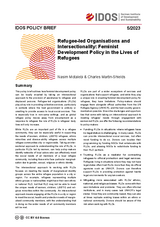Policy Brief
Refugee-led organisations and intersectionality: feminist development policy in the lives of refugees
Motalebi, Nasim / Charles Martin-ShieldsPolicy Brief (5/2023)
Bonn: German Institute of Development and Sustainability (IDOS)
DOI: https://doi.org/10.23661/ipb5.2023
This policy brief outlines how feminist development policy can be locally enacted by taking an intersectional approach to the provision of assistance to refugees and displaced persons. Refugee-led organisations (RLOs) play a key role in providing collective services, particularly in contexts where the host government is unlikely or unwilling to provide access to local social services. This is especially true in non-camp settings, and as global refugee policy moves away from encampment as a response to refugees the role of RLOs in refugees’ daily lives will only increase.
While RLOs are an important part of life in a refugee community, they can be especially useful in supporting the needs of women, children, LGBTIQ refugees, ethnic minorities and diverse-ability refugees across multiple refugee communities city- or region-wide. Taking an inter¬sectional approach to understanding the role of RLOs, in particular RLOs led by women, can help policy-makers identify networks of local actors who can effective¬ly meet the social needs of all members of a local refugee community, including those who face particular marginali¬sation due to gender, sexual, religious or ethnic identity.
The intersectional approach to working with RLOs focuses on meeting the needs of marginalised identity groups across the entire refugee population in a city or region. For example, refugees representing multiple ethnic groups or nationalities might have their own ethnic or national RLO, but that RLO may not be able to meet the unique needs of women, children, LGBTIQ and reli¬gious minorities within the community. An inter-sectional approach means engaging all the RLOs in a city or region to meet the social, health and protection needs of margin¬alised community members, with the under¬standing that in doing so the wider needs of all community members will be met.
RLOs are part of a wider ecosystem of services and organisations that support refugees, and while they play a unique role in enacting feminist development policy for refugees, they have limitations. Policy-makers should engage them alongside official authorities from the UN Refugee Agency (UNHCR), and the host country govern¬ment when possible. Given the challenges and opportuni¬ties that come with taking an intersectional approach to meeting refugees’ needs through engage¬ment with women-led RLOs, we offer the following recommendations to policy-makers:
• Funding RLOs in situations where refugees have no legal status is challenging. In many cases, RLOs can provide intersectional social services, but often need funding to do so. Donors can localise their programming by funding NGOs that collaborate with RLOs, and allowing NGOs to redistribute funding to their RLO partners.
• Trusting RLOs as a mediator for connecting refugees to official protection and legal services. Refugees living in situations where they may not have legal status often trust RLOs more than they do official agencies such as UNHCR. Donors can therefore support RLOs in providing protection against hostile legal environments for asylum seekers.
• Mitigating risks associated with RLOs’ ethnic, national, and religious biases. RLOs come with their own limitations and problems. They are often informal institutions, and in many cases lack UNHCR’s legal status. Since they are community-based, they can also at times replicate existing biases within an ethnic or national community. Donors should be aware of this risk when working with RLOs.
Contact
Cornelia Hornschild
Publication Coordinator
E-mail Cornelia.Hornschild@idos-research.de
Phone +49 (0)228 94927-135
Fax +49 (0)228 94927-130
Alexandra Fante
Librarian/ Open Access Coordinator
E-Mail Alexandra.Fante@idos-research.de
Telefon +49 (0)228 94927-321
Fax +49 (0)228 94927-130




![[Translate to English:] Photo: Alexandra Fante, Bibliothekarin/Open Access-Koordinatorin](/fileadmin/_processed_/f/0/csm__c_Deutsches-Institut-fuer-Entwicklungspolitik_Fante_94ce4fa1ba.jpg)